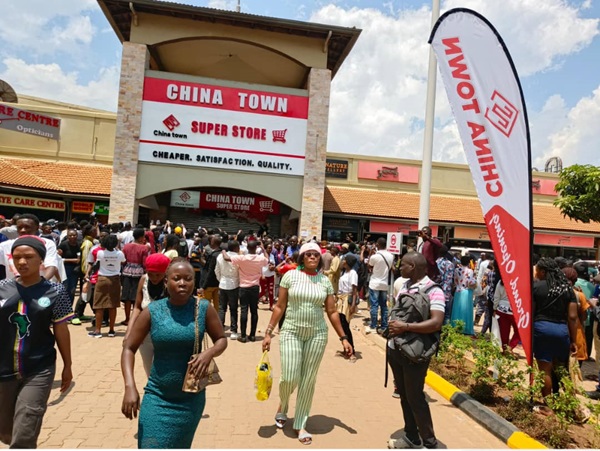
COMMENT | Gertrude Kamya Othieno | Following my recent essay on China Town and local enterprise in Uganda, reactions have been mixed. While some welcome the availability of affordable goods, it’s crucial to consider the long-term impact on Uganda’s economy and society.
The rise of China Town in Lugogo, Kampala, echoes the hypermarket boom in the UK during the 1980s and 90s, when giants like Sainsbury’s aggressively expanded, leading to the decline of many local shops, often run by immigrant communities. The pattern now emerging in Uganda could be even more severe. As China Town superstores spread, they may encroach on other sectors, including agriculture. Chinese investors are already involved in rice production in Uganda, raising concerns that they might expand into staple foods like matooke. This could jeopardise rural communities reliant on small-scale farming, potentially displacing them and exacerbating food insecurity.
This trend highlights a broader issue of global capitalism, where multinational corporations undermine local economies. In the UK and US, the dominance of mega-corporations has led to job losses and economic decline in once-thriving towns, with the promised benefits of globalisation failing to materialise for most. The closure of local businesses has been followed by an increase in low-wage jobs, worsening income inequality. The UK’s experience, marked by social unrest and misplaced blame on immigrants for job losses, underscores the problem with unchecked global capital.
For Africa, the consequences could be even more severe. The influx of cheap, imported goods threatens to destabilise local economies, particularly in rural areas where agriculture is vital. Increased foreign investment in agriculture could drive local farmers out of business, leaving them vulnerable. Additionally, the rising use of GMOs and synthetic foods poses risks to public health, potentially worsening environmental illnesses and health crises linked to processed foods and pollution.
The impact of global capitalism on health is evident. Many African countries are seeing a rise in non-communicable diseases, such as diabetes and heart disease, related to lifestyle changes and processed foods. This health crisis, combined with economic pressures, creates a cycle of poverty and ill health that is difficult to break.
The World Economic Forum’s Great Reset agenda, which envisions a future where “you’ll own nothing and you’ll be happy,” seems alarmingly relevant. The unchecked expansion of foreign-owned megastores could strip local communities of their economic autonomy, creating a dependent and vulnerable population.
To mitigate these risks, strong leadership, strategic policymaking, and community empowerment are essential. Leaders like Captain Ibrahim Traoré of Burkina Faso offer a model for resisting neo-colonial economic policies. Traoré’s emphasis on self-reliance and local empowerment could serve as a guide for other African nations. Prioritising local industries, investing in sustainable agriculture, and regulating foreign investments are crucial steps to protect our economies and ensure development benefits everyone.
Furthermore, educating the public about the long-term effects of relying on cheap imports is vital. Policies supporting local farmers and businesses, such as subsidies or tax incentives, can help them compete. Public health campaigns should address the risks associated with GMOs and processed foods, promoting organic and locally-sourced alternatives.
In conclusion, Uganda stands at a crossroads. We can either follow a path that could replicate the economic and social problems seen in other nations or choose a new route that prioritises health, wealth, and sovereignty. The decision is ours, and the stakes have never been higher.
***
 Gertrude Kamya Othieno | Political Sociologist in Social Development (Alumna – London School of Economics/Political Science) | Email – gkothieno@gmail.com
Gertrude Kamya Othieno | Political Sociologist in Social Development (Alumna – London School of Economics/Political Science) | Email – gkothieno@gmail.com
 The Independent Uganda: You get the Truth we Pay the Price
The Independent Uganda: You get the Truth we Pay the Price




As a new youth in Uganda,i have all rights to say that everything I see is new to my face.
It was our grands to hustle for our fathers’ better,so we the grand children would be best.
All in all,they failed.
It is now we the grand children to hustle for the better of our Grand children.
Note my point,I will be gratefull.
I want to make a permanent change on this world before i kick my Glass of water.(die)insha Allah.
It’s unfortunate to hear that that your ancestors failed to make you better;and yet you can communicate to the world in English;what a scam!!!
I am so sorry, but you’re so naive, does speaking English means someone is well off?!!!
One verse in the Bible that discusses parents leaving inheritance for their children is found in Proverbs 13:22, which states, “A good person leaves an inheritance for their children’s children, but a sinner’s wealth is stored up for the righteous.” This verse emphasizes the importance of financial planning and inheritance for future generations.
Don’t blame your parents for anything. Many of us young people feel entitled as if the world is just a magic wand. Then why didn’t your father blame his grandparents for not making his life better? What my father made is his, and I gotta make mine as a dignified man not a child. Cut that GenZ slogan nonsense yet you’re not doing any sacrifice to make the country or even your community or family better. Cut your childish bs. Grow up out of your incompetence which I can see through your mashed up English. Stop watching too much tiktok and get to work and gain knowledge. Start by writing correctly
You’re also sick,but is that true since your name is truther. Re. One verse in the Bible that discusses parents leaving inheritance for their children is found in Proverbs 13:22, which states, “A good person leaves an inheritance for their children’s children, but a sinner’s wealth is stored up for the righteous.” This verse emphasizes the importance of financial planning and inheritance for future generations.
Truther stop calling yourself that,because you’re a sinner.
Doesn’t that pose serious risk to our local manufacturing industry?
China Town and its cheap goods came in because our Ugandan government encouraged and invited manufacturers world over to come into uganda and invest in our designated industrial parks country wide and so chinese responded and came in, set up factories and produced massively and cheaply.
But then Chinese noticed that ugandans were not buying these Ugandan produced goods simply because of the exorbitant charges that local traders put on these goods at their shops.
So the set up of china Town hypermarket is to offload the cheaply locally produced goods and to trigger consumerism among ugandans.
We should blame our education system, we graduate to look for jobs and get employed, failure our degrees are useless, we can’t creat jobs for ourselves. Our lectures too are trained to lecture students and go back to there houses to sleep till next lecture class is available. Why should i get master degree or PHD and I cant employ myself or open my own school , creat my own industry or my own NGO and employ people starting with myself. God bless Africa.
Guys read the book,”Confessions of an Economic Hit Man”
Everything is falling before our eyes is not by mistake. You are hearing of all these drama around the globe by the West .I will not call China a Saint ,except China is using different approach than the West but if you analyse ,the end result is the same.African heads of state have just concluded China-Africa summit and my guess is ,”most Countries will be given big loans to boost their economy but all loans comes with terms and conditions which our governments will never tell us before getting” .Why do U think most roads , bridges,power lines ,Telecom sector infrastructure among others are built by foreign companies,”Chinese”&”The West”.They are using their very companies to do the implementation for the projects which those loans were signed against,hence all the money is repertraited back to their countries rember these are loans which we have to pay with interest once we fail to pay,our leaders end up becoming Puppets because of the original deal which most of them signed when getting these loans .
@ James, I read the book. Spot on! ‘He who pays the piper calls the tune.’
The only way we can strategically navigate that White collar economic theft is to build local capacity for infrastructure development projects, why should African countries keep awarding Owners Engineer contracts to foreign companies dictated by the lender?. Indeed almost 90% of infrastructure loans ends up back into the lenders economy. Sometimes I wonder whether those in charge appreciate the magnitude and consequences of their decisions.
We want chine stores branch here in fort portal
One verse in the Bible that discusses parents leaving inheritance for their children is found in Proverbs 13:22, which states, “A good person leaves an inheritance for their children’s children, but a sinner’s wealth is stored up for the righteous.” This verse emphasizes the importance of financial planning and inheritance for future generations.
I bought something which was missing but you told me it was over in your store now am waiting for three months you promised to call no àny call from you guys